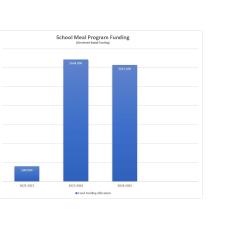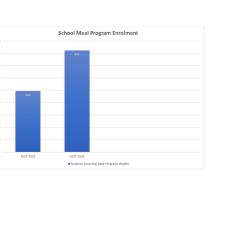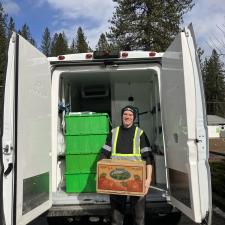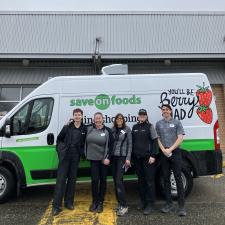Food Equity Programs
Food equity in schools means ensuring students have access to nutritious food every day so they can learn, grow, and thrive with dignity.
Confidential Support for Families
If you and your child(ren) are in need of support, please reach out to the principal at your child's school to learn about a variety of food programs and resources that are available, such as no-fee meal programs during the school day. All inquiries are completely confidential.
Parent Info - What is for lunch and snack?
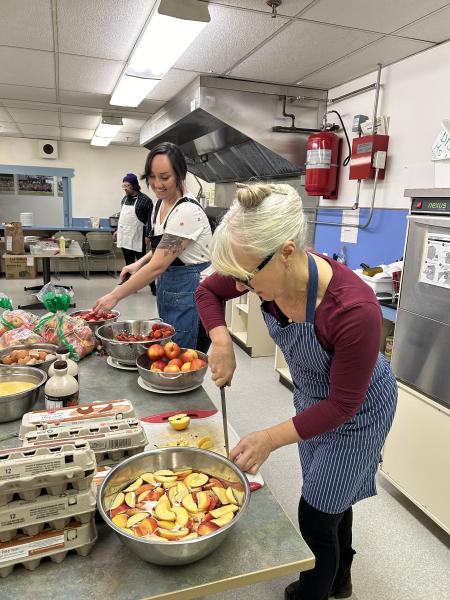
Feeding Futures
In 2023, the B.C. Government committed $214 million over three years so school districts can create or expand local food programs in schools throughout B.C. In April 2024, the Government of Canada announced an investment of $1 billion over five years to expand school food programs across the country.
Nutrition Guidelines for Schools
The Canada Food Guide
The Canada Food Guide is the primary document used in the District to define nutrition standards in school. The Canada Food Guide provides a snapshot of healthy eating recommendations, recipes, tips and resources.
Food and Beverage Sales in B.C Schools
The Guidelines for Food and Beverage Sales in BC Schools is the Provincial nutrition framework developed by the Ministry of Education to define the minimum nutrition standards that schools are required to use to determine what food and beverages can be sold to students. This document contains information, tools and fact sheets to support implementation of the Guidelines across the school setting.
Food Fundraising Guide for Schools
Schools are permitted to facilitate food fundraisers. Food fundraisers during the school day, such as breakfast or lunch programs, must meet the Canada Food Guide. Please refer to the Food Fundraising Guide for Schools for further information.
Food Safe Certification
Those involved in the preparation of food for students in schools need to be food safe Level-1 certified. Please find below a link to an online food safe course.
Link: Food Safety Training | Online Food Handler Courses Available | CIFS
School District 8 Food Funding
School District 8 has received an increase in funding to support the food security needs of students in the District. Funding prior to the Feeding Futures program was roughly $80,000 which has now increased to over $600,000 through the introduction of the Feeding Futures program. This funding is entirely enrollment based, and thus it will fluctuate year to year. Please refer to the graph below in the image gallery to see how funding has changed since 2022 in School District 8.
School District 8 Food Program Enrolment
As a result of this incredible investment in school food programs across B.C from the Ministry of Education, we have been able to increase the number of students accessing meals during the school day from 494 to over 800 in just one year. Not only are we able to increase the quantity of meals being provided but we are also able to improve the quality. Please refer to the graph below in the image gallery to see how program enrolment has increased since 2022.
We could not achieve this milestone without the help of our incredible community partners. Thanks to Save-On Foods and the Kootenay Co-op, we have been able to get local food into schools. Save-On foods has delivered weekly to our rural schools in Salmo and as far as Winlaw to ensure students can access nourishing, nutritious, and consistent meals during the school day. Further thanks goes to the Kootenay Farms Food Hub for providing over 100 meals with locally sourced ingredients to students in need in Creston, B.C. Ariah's Edibles in Glade was also able to provide over 2000 additional meals to students in need in the Nelson community, all of which used whole-foods, organic produce, ancient grains, and B.C grown vegetables.
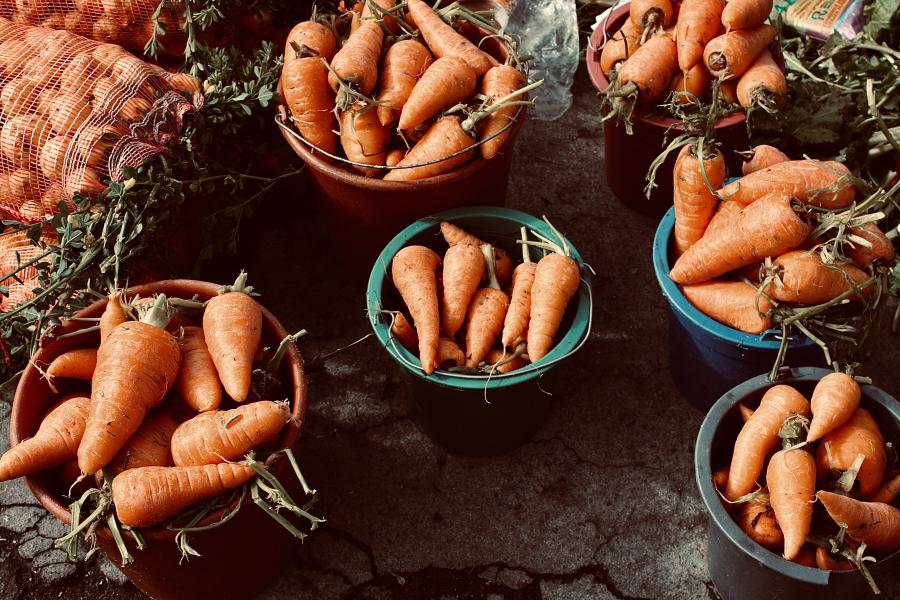
Indigenous Food Programming and Supports
School district 8 is committed to providing and fostering inclusive food programming that is representative of the cultures, values, and priorities surrounding food in the district, including those of the indigenous communities whose traditional territories the Kootenay Lake School District operates and all of the aboriginal people residing within the boundaries of School District #8. Below are some resources that are sent to schools which contain staple items and recipes, traditional food procurement methods, education surrounding de-colonizing food systems, and more.
The Nuu-Chah-Nulth Healthy Eating on a Budget Cookbook For Diabetes & Diabetes Prevention
Healthy Eating on a Budget Cookbook For Diabetes & Diabetes Prevention
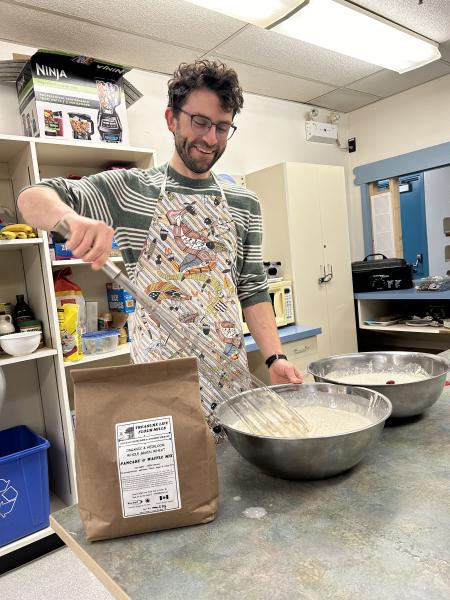
Nutritious Eating Resources for Families
Tips and Recipes for Quantity Cooking: Nourishing Minds and Bodies
Template Menu's for Every Meal Program Model
Buy B.C Food Guide
B.C food grows local communities and economies. School District 8 has a goal of spending 30% of our Feeding Futures food budget on B.C produced or processed food as a means of supporting the hard working farmers in our community. Check out our B.C Food Guide below with sample items from Save-On that are grown or processed right here in B.C
Family Fun with Food!
Sample Activities for Families to engage with food and nutrition
- Veggie Building
- What a better way to get kids excited about healthy snacking then with a fun fruit and vegetable building activity?
- Cut up some fruit, vegetables, and cheeses into smaller bite sized pieces (e.g., apples, grapes, cherry tomatoes, cubed cheese, etc.)
- Try incorporating new items, like broccoli or cauliflower in order to pique curiosity
- Buy round toothpicks and build structures together with the various items available, and talk about the shape, texture, taste, color, and so forth.
- Garden Vegetable Printing
- Using fruits and vegetables for art can have great influence on eating them as you will see. Don't shy away from playing with food, especially if you have a picky eater. Tip: buy imperfect items from the store, harvest fresh from the garden, or use veggies that are almost on their way out and not being used.
- Gather your materials: a few veggies and/or fruits, paper, paint, paper towel, scissors, and a dish or two.
- Start by pouring paint into the dish
- Add the cut veggies and fruit and start stamping them onto the paper!
- Save some un-touched items for a snack after and talk about the colors, taste, texture, and smell
- Colouring pages!
Family Food Adventures!
Food is a fun way to connect as a family.
- Activities outside the home:
- Go fishing and catch your own food
- Take a trip to the farmers market and discuss the different kinds of fruits and vegetables you see, identify their colour, shape, and smell. Tip: Find a recipe online or from a cookbook beforehand and purchase a fresh item from the market to include.
- Take a trip to a local farm or apple orchard and talk about all of the varieties available in your region
- Take a trip to a new grocery store, such as KTK Masala shop, and talk about all of the diverse and delicious spices or items that are available from other countries.
- Nelson Public Library
- Food preservation, stretching the food budget, and sustainability
- Pressure canner, dehydrator, cookbooks, and more!
- Nelson Public Library cookbooks can help you save money and reduce food waste
- Canning and Preserving
- Food preservation, stretching the food budget, and sustainability
- Activities within the home:
- Watch a cooking show together
- Growing your own fresh herbs or vegetables
- Taking a cooking class together in the community
Canada Food Guide Toolkit for Educators and Families ages 9-11
- These activities are intended for Children aged 9 to 11 years old. They will help them learn:
- To identify different cooking methods
- About foods that are part of different cultures and traditions
- To practice eating thoughtfully and making eating enjoyable
- These activities support children in experiencing and exploring foods which are part of the Canada's Food Guide
- Connecting people in the kitchen, teaching hands-on cooking skills, and making healthy eating, grocery shopping, and cooking easy, quick, and fun.
- Food Skills Sample Recipes

Kootenay Local Farm Directory
- Confluence Farms
- Confluence Farms is your one-stop-shop for the best locally grown and artisan-made products! They offer veggies, flowers, a wide selection of pantry items made from ingredients grown on their farm, as well a baked goods made from freshly milled flour that they mill themselves using locally sourced grain.
- Check out their online shop for delivery right to your door!
- Forest Farm Salmo
- Farmstand is open EVERY DAY from 8am to 4pm YEAR ROUND, at 1244 Airport road in Salmo.
- Hoe Down Farms Krestova
- Hoe Down Farm is a small farm using low-till and regenerative agriculture practises.
- You can find their products at Castlegar farmer's Market, Nelson Farmer's Market, CSA, home delivery
- Kootenay Meadows Creston
- Dairy product made with milk exclusively from their grass fed certified organic farm.
- Visit their farm shop and enjoy a walk about the farm. Cows milk all day long in a voluntary robotic milking system.
- Kootenay Natural Meats Creston
- Quality meat raised naturally on their farm from birth to finish with high standards of land and animal stewardship using regenerative and sustainable farming methods.
- You can find their products at farmers markets, online shop + delivery, farm gate, Kootenay Coop Nelson
- Linden Lane Farms Krestova
- Linden Lane Farms makes it easy to eat healthy! Their main focus is to produce high-quality, certified organic vegetables and small fruits for the communities in the Central Kootenay region.
- Find their products at the Nelson Wednesday Market, Saturday Nelson Cottonwood Market, Castlegar Farmer's Market, Kootenay Coop, Evergreen Foods, and their Farm Stand
- Be sure to check out their harvest festival every fall with pumpkin picking, warm drinks, and fresh veggies!
- Ravine Creek Farm Winlaw
- RAVINE CREEK is a certified organic, family run vegetable farm on 10 acres in the Slocan Valley, British Columbia. They are committed to demonstrating vibrant ecological health on a working farm. Their presence serves to engage our community in food production, habitat stewardship, and supporting our local economy
- Find their products at the Nelson Farmers Market, CSA box program, and farm gate.
- Bent Plow Farm Blewett
- Bent Plow Farm is tucked away in a flat, sunny oasis in Blewett BC, just outside of Nelson. We grow a wide range of certified organic vegetables for local farmers' markets and CSA customers
- Find their products on the farm, at the Nelson Farmers Market, and as a part of their CSA program
- Duhamel Creek Apiaries Nelson and Salmo
- From yards on the Nelson’s North Shore and the Salmo area, the bees and Kenneth produce two brands of honey: Six Mile Honey and Salmo River Honey. While no floral source predominates in any of their areas, each yard has its own unmistakable signature flavour which develops as the season progresses.
- Find their life changing honey at the local Nelson Farmers Market and Ellisons Market in Nelson.

School District 8 Community Partners
Kootenay Farms Food Hub and Fields Forward Society, Creston, B.C
- The Fields Forward Society is a non-profit organization devoted to the development of a vibrant local agri-food system that sustains the community’s environmental, and economic values. Fields Forward promotes the development of food production in the Kootenays, careers in the food and farm sector, and access to healthy local foods.
- The Kootenay Farms Food Hub is working with School District 8 to support the provision and delivery of some of Canada's best produce right from the Creston area into our school environment. In 2024-2025, we will be further exploring the development of food literacy workshops and fieldtrips to the Hub for students to learn about food innovation and all of the ways we can utilize fresh produce in our daily lives.
- The Kootenay Farms Food Hub ran a successful pilot project in the spring of 2023 which delivered over 100 meals to students in need with fresh ingredients sourced from the Creston and surrounding area.
Ariah's Edibles, Glade, B.C
- Ariahs Edibles is nestled in the heart of the Kootenay Mountains in Glade BC. Ariah is originally from Edmonton, and it was there twenty three years ago that her and her family were searching for a way to support organic farming. Ariah and her sisters decided to open a bakery, calling it Manna Foods, and used only whole, organic ingredients. They based their recipes on their Mother Jean's and Grandma Irene's baking and cooking that inspired them growing up.
- After four years of running Manna Foods, the family wanted to experience a lifestyle that would further support their intentions. They sold their bakery and moved to Nelson BC. Thirteen years ago, she struck out on her own and created a commercial kitchen space with the intention of sharing her products with a larger market.
- Ariah provides meals to students all across School District 20, and now School District 8. In 2023-2024, Ariah ran a pilot program that provided over 2000 meals to students in need here in the West Kootenay's.
- In 2024-2025, Ariah will be providing almost 300 meals a week to students in our rural communities. All of Ariah's meals are made in house, using organic produce, ancient grain spelt, and zero preservatives or processed ingredients.
Thank you to all of our valued community groups for supporting the District to address food security in our schools here in the West Kootenay's!
Save-On Foods, Nelson and Creston, B.C
- From the start of the Feeding Futures program, Save-On foods has been a committed and dedicated community partner in the fight for food security in the community. Save-On foods delivers weekly to our rural schools in Salmo and all the way to the Junction through to Winlaw to ensure students have access to consistent, nutritious, and nourishing food to support their learning and development.
- We could not run these programs if it weren't for the generosity of the entire team at Save-On Foods who always have a smile on their face and a lending hand to offer. Thank you Save-On Foods for helping feed our students!
Other Community Partners
- Nelson Community Food Centre
- Elk Root Conservation
- Kaslo Community Services
- Interior Health
- Kootenay Co-Op
- Treasure Life Flour Mills
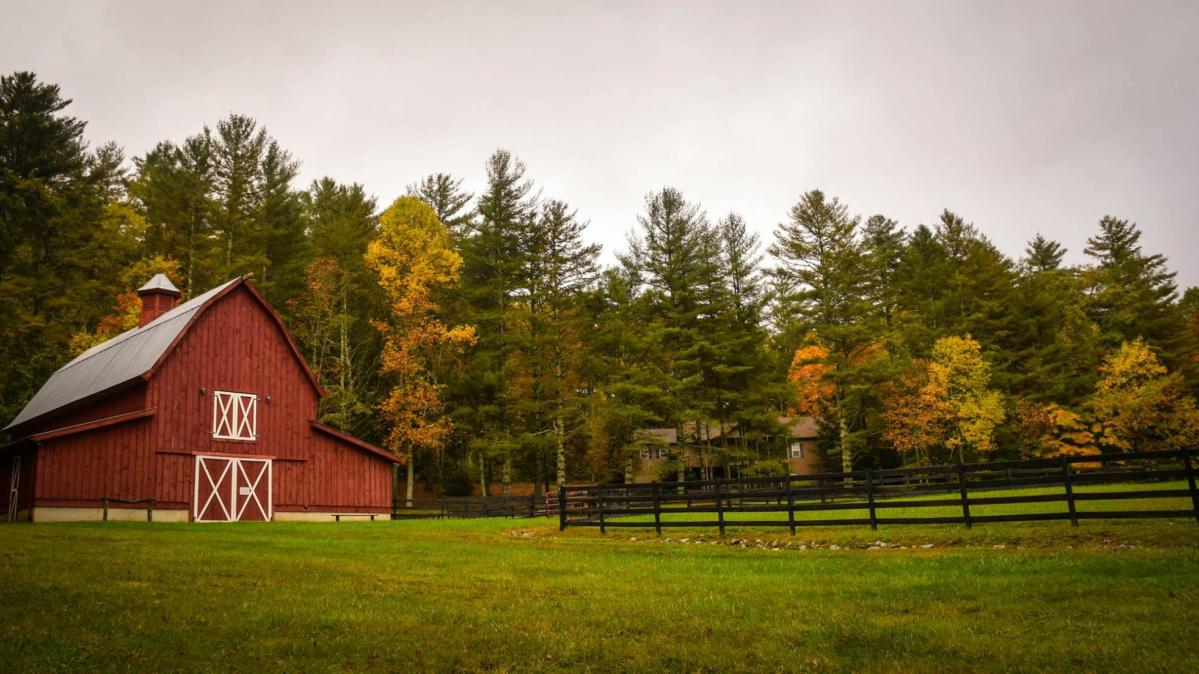
Frequently Asked Questions
I am a parent and I need support with food and nutrition during the school day for my child
If you are a parent, please contact your child's Principal in order to learn about the various supports and resources available to you and your child, such as no-fee meals and snacks during the school day. Parent and student confidentiality will be strictly maintained.
I am a parent and I need support at home with food and nutrition
If you require nutrition related support within the home, please contact either your family physician or dial 8-1-1 to speak with a registered dietician through Healthlink BC and the Ministry of Health. For more information, click here.
What is the purpose of the new school food programs funding?
The funding is to make sure that students are fed and ready to learn by expanding existing school food programs. Emphasis is on providing a meal during the school day, such as breakfast or lunch, and providing supplementary snacks.
Who qualifies for this funding?
The 60 public school districts in B.C. The funding is expected to reach the 20% of the students who are facing food insecurity across the province.
Have schools received more funding than in previous years?
Yes, schools have received more funding than in previous years from Feeding Futures
How do we start building a school food program in our district/school?
Please visit www.gov.bc.ca/bcschoolfood which contains information on how to start and/or expand a school food program. Please connect with your school principal to work together on creating a plan.
Can we work with non-profit organizations or current community partners?
Yes, community inclusion is essential for a long-term model of feeding students; non-profit organizations, corporate donors, and parent advisory councils will continue to play a vital role alongside schools to deliver school food programs.
Where can I find resources regarding healthy food?
The following documents help guide nutrition within schools and can be used within the home as well to create healthy and balanced meals.
I am a parent, how do I offer support to the school?
If you are a parent wanting to offer support to your child's school food program, please reach out to the school principal to find out about volunteer opportunities.
I help a school with their meal program, how do I get my plan approved?
The school district appreciates all of the hard work that community members and PACs put into helping develop and run the food programs in schools. If you want to get involved, please reach out to the principal at your school for more information.
Where can I find resources for indigenous food practices and recipes?
Below are some documents that are sent to schools to encourage cultural diversity and reconciliation through food programming in schools. These are resources that are available to the public and can be used by families, community organizations, etc.
Healthy Eating on a Budget Cookbook For Diabetes & Diabetes Prevention
What is the BC Fruit and Vegetable Nutrition Program?
The BC Fruit and Vegetable Nutrition Program is a program that delivers healthy fruit and vegetable snacks to over 492,000 children in schools across B.C. This includes the +Milk program to some schools of elementary age. The program aims to increase students acceptance of, exposure to, and willingness to try fruits and vegetables as well as their knowledge and awareness of locally grown foods. The program works with local growers and distributors to bring fresh BC products to school. Every school in SD8 is enrolled in this program and will receive 24 weeks of deliveries which has been topped up 25% from previous years.
What grants are available for schools to access for food?
Breakfast Club of Canada
They accept applications year-round from schools, School Boards/Districts, community organizations, and Band Councils seeking support for breakfast programs offered to school-aged children and youth during the school year.
The Vancouver Sun Children's Fund - Adopt-A-School Program
If your schools is in need of support for food, clothing, and/or learning tools, this program is designed to provide funds and other basic necessities for children in need and they accept applications from school and school boards throughout B.C
Show kids you care helps fund the cost of food and equipment needed to store and serve meals. They also work to educate the public about child hunger issues and the need for a national meal program.
TD Friends of the Environment Grant - New projects yet to be developed
Eligible projects include schoolyard greening, park revitalization, community gardens, park programming, citizen science initiatives, etc.
Schools may apply for a maximum of $3,000 to invest in your Farm to School BC project. The amount granted will be dependent on the scope of your proposed program.
A total of 30 grants will be distributed this year across the province with a priority of 50% of all funding dedicated to supporting rural/remote and First Nations schools.
What is Backpack Buddies?
Backpack Buddies is a program designed to fill backpacks with food items that can be sent home with students on Fridays with food to last them the weekend. If you are interested in obtaining a backpack for a student, please contact your school principal to enrol.
Information about the program can be found here: Backpack Buddies | Feed Children Across BC
What is the difference between a convenience, universal, and food equity food program?
A universal lunch program is one that ensures food is accessible to all students in the school free of charge. A convenience program is one that provides meals that are purchased from restaurants to all students in a school for a fee. A food equity program is one that prioritizes students who are experiencing food insecurity. The District uses Feeding Futures to subsidize convenience food programs for students experiencing food insecurity.
Are districts expected to offer universal food programs to students?
The funding is expected to reach the 20% of the students who are facing food insecurity across the province/district. Building the capacity in each school community to work towards stigma and barrier free access to nutrition food for any student who needs it will take time.
I would like to donate produce to a school. Who do I contact?
Donations of any sorts are greatly appreciated by schools, especially fresh produce. If you would like to donate produce to a school, reach out to kelly.mccafferty@sd8.bc.ca to get a list of schools in your area that would like to receive these donations. Donors can also reach out to school principals directly if there is a specific school you are looking to donate to.
I am a parent and I need help packing a nutritious lunch for my child
Lunch is an important part of your child’s day. Eating a variety of nutritious foods while at school helps your child get the energy and nutrients they need to learn during the day and support their growth and development. Lunches to go is a resource that can help you pack a nutritious and nourishing lunch for your child.
Why does healthy eating matter for kids?
Childhood and adolescence is a time of growth, development and learning. As a parent, you play an important role in:
- developing your family’s food skills
- creating a healthy food environment
- supporting your child’s interest in healthy food
- shaping your child’s eating habits and behaviours
How you choose and prepare your food will shape your family’s attitude, skills and eating behaviours.
As children grow, their peers may become more of an influence. Children, however, still look to their parents and other adults around them for guidance.
Click here for resources from the Canada Food Guide on healthy eating habits for your family.
Want to get your kids more involved in mealtime?
Involving kids in planning and preparing meals teaches them food skills and the importance of healthy eating. By involving kids in planning and preparing meals, you can:
- nurture healthy eating habits
- increase their self-confidence
- share culture and family traditions
- give them hands-on learning experiences
- stay connected and spend quality time together
- encourage picky eaters to try foods they helped prepare
- set the foundation for children to learn and improve food skills
Click here for more information from the Canada Food Guide on involving your kids in meal time!
Are you looking for inspiration to cook more often?
Cooking more often can help you develop healthy eating habits. You can cook more often by planning what you eat and involving others in planning and preparing meals. Click here for tips and ticks on how to incorporate home cooked meals into your families diet!
